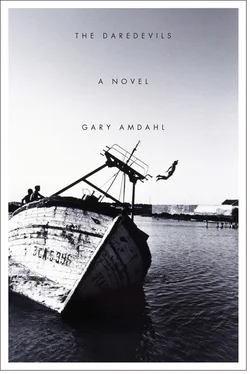“Yes. These characterizations persist. My masters at the MCPS speak in those flights of rhetoric as well.”
“One of the more dashing and devilishly handsome Italian men from Chicago befriended Rosemary in Lawrence, began to school her, and, after he’d secured an abortion for her, to sleep with her. By the time we arrived in Paterson, New Jersey, for a strike by silk workers that would last nearly half a year and include twenty-five thousand weavers, loomfixers, twisters, and warpers, she was again pregnant and again in charge, at least nominally and picturesquely, of ‘the evacuation of the children.’ Many years, a lifetime, and no time at all, seemed to have been passed — or rather, a moment was imperceptibly repeating. Rosemary found it nearly impossible to fix herself in a secure and ordinary sense of time and place, in the life of the community — on which fixing, of course, sanity, almost solely, depends. The irony of her situation was lost on no one, and the belief that her first child had been aborted not by a doctor but the fat Irish cop who fell off his horse and knocked her down, became common, and eventually legendary. Some versions even had her shoved off the platform and under the wheels of the train, which had just begun to move, or within days and not months of delivery, that she had given birth to a dead baby in the cloakroom of the station. She was also informally apprenticed to the editor of the Passaic Weekly Issue, a socialist who was shortly to write an editorial critical of Paterson policemen that would land him in prison for fifteen years. In the course of becoming something like the press secretary for the Chicago IWW, she found some purchase, entered into some valuable routine, and remained more or less sound.”
“This sounds unmistakably like you. Your life.”
“She learned to defend herself calmly and articulately: she had hurt and coerced no one, she had not even argued with people, she had simply stood there looking out for the children, who would tell you if you cared to speak to them of lives the stink of which would never leave their nostrils. And in this way she began to develop as well a persona and philosophy: ‘If you cannot obey’—she wrote with the aid of the PW editor, who had also begun to fuck her—‘you cannot command. I have found in my short life almost no one whom I wish to obey, and therefore must decline command. Obedience and commandment are the surest means of terror I know.’ She was something like a pacifist-anarchist, and people who could not conceive of anarchism as anything other than deeply, inherently violent — that is to say, nearly everybody, found her paradoxical stance, in a word, fascinating. Lusty young men who liked to sing songs in bars about mining camp massacres and stage free-speech fights on street corners were particularly mesmerized by her, though it seemed to me she was growing less beautiful — more crazy-looking, sometimes even scarily so, with her huge bright eyes and the dark exhausted flesh surrounding them, lank, unkempt hair that not even the sturdiest hats could organize, the long, sharp nose, the extraordinary curves of her mouth, the big pigeon-toed feet and big-palmed, long-fingered hands. She had a charismatic but self-effacing presence: people liked, even longed, to be near her. One night at Mabel Dodge’s fashionable Greenwich Village salon, the Broadway producer David Belasco declared he would find a vehicle for her ascent to stardom. ‘I can’t act,’ said Rosemary. ‘Even speaking in a room like this makes me nervous.’ The room was blindingly white, from a burning white porcelain chandelier to a polar-bear-skin rug before a white marble fireplace, wherein pale birch logs appeared to give off pure white flames. The furniture was delicate and Florentine. Rosemary was a dark, quiet, untidy center of gravity.
‘Ah, but we’ve all seen you act!’ shouted Belasco, referring to her stand against the mounted policemen. ‘That’s not acting,’ said Rosemary. ‘There’s acting,’ said Belasco, ‘and there’s acting. Shakespeare said that all the world is a stage.’ ‘Who,’ asked Rosemary, ‘is Shakespeare?’”
“Who is Shakespeare? Who is Vera! That’s the question!”
“Tittering laughter failed to discourage Belasco. ‘If there’s an audience and they applaud, you are acting.’ ‘And if they throw rotten vegetables?’ ‘You are still acting, but less. ’ he searched for the right word, ‘popularly.’ ‘Oh, Mr. Belasco,’ said Rosemary coquettishly, ‘you say that to all your little Joans of Arc.’ And the titters became whoops and guffaws. He’d made a nearly identical sally at Elizabeth Gurley Flynn, whom the novelist Theodore Dreiser had called ‘the Eastside Joan of Arc,’ and who had brushed him famously aside saying she preferred to ‘speak her own piece.’ Though we hadn’t known it until several weeks later, it was Gurley herself who had rescued us from Willimantic. Belasco settled back in his chair and smiled good-naturedly, undeterred. He was smitten not only with Rosemary’s ungainly allure but with what he called ‘real realism, genuine objects—’”
“‘Real realism!’ Don’t make me laugh!”
“—genuine objects on his stages and not props, walls that did not shake when doors were slammed, an apple pie one could eat and not painted card-board. If he was going to do a show about a poor little mill girl, he wanted a poor little mill girl to play the part, wearing her own authentic clothing, usufructuary rights to which he was willing to pay handsomely for. He had astonished beggars in this very way—”
“Yes, yes, I know the ridiculous story.”
“—his assistants stripping the shirts off their backs as he peeled notes from a wad.
“The idea of a play about the Paterson silk workers did take hold that night. It would be a pageant, a series of more or less static tableau-like scenes depicting important episodes in the life of the strike, as vast and emotionally resonant as any ten productions in a cathedral by the great visionary of the theater Max Reinhardt, because it was real, with hundreds of workers onstage, playing themselves, moving from sorrow and desperation to triumph and glory via courage and principle. One of the wealthy intellectuals, John Reed, who had acceptable credentials as a daredevil journalist — he had ridden with the infamous bandido generale Pancho Villa, and had been in jail with scores of rank-and-filers in Paterson — made himself responsible for the mise-en-scène, both financial and artistic. A light-hearted lothario, he saw a lovely weird target painted on Rosemary’s back, and endeavored to be the salient feature in a world that she was surely experiencing as more and more delightful by the second.”
“‘Although it may indeed happen,’ I once read aloud to Rosemary, ‘that when we believe the truth A, we escape as an incidental consequence from believing the falsehood B, it hardly ever happens that by merely disbelieving B we necessarily believe A. We may in escaping B fall into believing other falsehoods, C or D, just as bad as B; or we may escape B by not believing anything at all, not even A.’”
“You— what’s that you’re saying?”
“I have to stop and think about it for quite some time—”
“I can’t believe I heard what I just heard.”
“—and all the thinking I’ve done about in the past never seems available to me or applicable when once again I turn to it, but that sums up our feelings quite as fully as is humanly possible. At least for me. At least in that wonderful moment when I am able to return to it, to think it again. We did not want to be caught up in belief and disbelief — and yet at the same time we wanted to act, we wanted to live! And you can’t live freely and fully, you can’t act boldly and easily, if you don’t properly believe in something. Conversing in this way, we — Rosemary, myself, and a friend of John Reed’s — turned on Twenty-Third and walked up Madison to the Garden, its yellow bricks and terracotta fading in the twilight while at the top of the tower, thirty-two stories high, the Saint-Gaudens statue of Diana swiveled back and forth two or three degrees in the gusty spring wind and caught the last red light of the setting sun. We entered the ground-floor arcades and I said that I liked arches, liked looking at them and walking through them. As the baffled wind blew through those arches, following us, gently carrying us, Rosemary asked me why I felt that way, but I had no answer. It was no great secret, I suggested, that people were drawn to archways, but whatever it was that was at work in that kind of architecture, I felt it very strongly. ‘It makes me feel soft and safe,’ I said, an admission that would have astounded if not choked us — we were Wobblies! — in any other circumstances. John Reed’s friend suggested—”
Читать дальше












